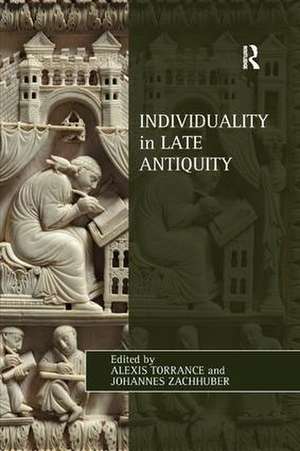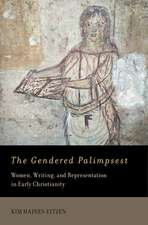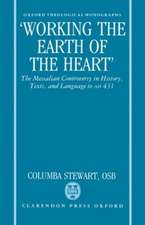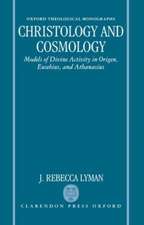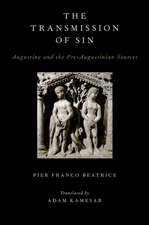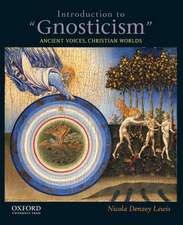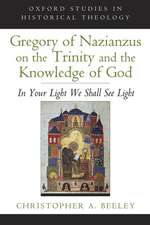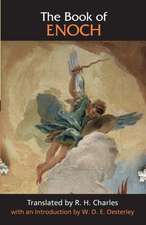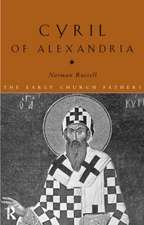Individuality in Late Antiquity: Studies in Philosophy and Theology in Late Antiquity
Editat de Alexis Torrance, Johannes Zachhuberen Limba Engleză Paperback – 12 feb 2018
| Toate formatele și edițiile | Preț | Express |
|---|---|---|
| Paperback (1) | 436.14 lei 43-57 zile | |
| Taylor & Francis – 12 feb 2018 | 436.14 lei 43-57 zile | |
| Hardback (1) | 1056.28 lei 43-57 zile | |
| Taylor & Francis – 28 feb 2014 | 1056.28 lei 43-57 zile |
Din seria Studies in Philosophy and Theology in Late Antiquity
-
 Preț: 327.29 lei
Preț: 327.29 lei -
 Preț: 385.58 lei
Preț: 385.58 lei -
 Preț: 469.34 lei
Preț: 469.34 lei - 14%
 Preț: 324.86 lei
Preț: 324.86 lei -
 Preț: 436.14 lei
Preț: 436.14 lei -
 Preț: 383.12 lei
Preț: 383.12 lei -
 Preț: 469.34 lei
Preț: 469.34 lei -
 Preț: 390.25 lei
Preț: 390.25 lei -
 Preț: 384.86 lei
Preț: 384.86 lei
Preț: 436.14 lei
Nou
Puncte Express: 654
Preț estimativ în valută:
83.47€ • 86.82$ • 68.91£
83.47€ • 86.82$ • 68.91£
Carte tipărită la comandă
Livrare economică 14-28 aprilie
Preluare comenzi: 021 569.72.76
Specificații
ISBN-13: 9781138546080
ISBN-10: 1138546089
Pagini: 204
Dimensiuni: 156 x 234 x 11 mm
Greutate: 0.45 kg
Ediția:1
Editura: Taylor & Francis
Colecția Routledge
Seria Studies in Philosophy and Theology in Late Antiquity
Locul publicării:Oxford, United Kingdom
ISBN-10: 1138546089
Pagini: 204
Dimensiuni: 156 x 234 x 11 mm
Greutate: 0.45 kg
Ediția:1
Editura: Taylor & Francis
Colecția Routledge
Seria Studies in Philosophy and Theology in Late Antiquity
Locul publicării:Oxford, United Kingdom
Cuprins
Contents: Preface; Introduction, Johannes Zachhuber and Alexis Torrance; Individuality in some Gnostic authors, with a few remarks on the interpretation of Ptolemy’s Epistula ad Floram, Christoph Markschies; Astrology and freedom: the case of Firmicus Maternus, Mark Edwards; Plotinus on sensible particulars and individual essences, Riccardo Chiaradonna; Logico-grammatical reflections about individuality in late antiquity, Julie Brumberg-Chaumont; Individuality and the theological debate about ’hypostasis’, Johannes Zachhuber; Individuality and identity-formation in late antique monasticism, Alexis Torrance; Individuality and the Resurrection in some late antique texts, Yannis Papadogiannakis; John Philoponus on individuality and particularity, Christophe Erismann; The religious constitution of individuality: one motif of Augustine’s Confessions in modern intellectual history and theology, Wilhem Gräb; Bibliography; Index.
Notă biografică
Johannes Zachhuber has published extensively on various aspects of late antiquity, in particular the thought of Gregory of Nyssa, and co-edited numerous collections. Publications include: Human Nature in Gregory of Nyssa. Philosophical Background and Theological Significance (Leiden: Brill, 1999), and Gregory of Nyssa, Contra Eunomium: An English Version with Supporting Studies. Proceedings of the 10th International Colloquium on Gregory of Nyssa, (Leiden: Brill, 2007) (edited with L. Karfiková, S. Douglass). Alexis Torrance specializes in late antique monasticism and asceticism in the Eastern Mediterranean. His publications have appeared in Journal of Early Christian Studies, Vigiliae Christianae, Studies in Church History, and The Heythrop Journal.
Recenzii
’The problem of the individual is central to our notion of modernity. These thoughtful and deeply learned essays take us back to a thought world where the notion of the individual had begun to emerge. It did so in what to us are deeply unfamiliar circumstances - in the wrangles of Christian theologians on the nature of the Trinity, the personhood of Christ, and the resurrection of the body; in the lucubrations of Platonic philosophers on the relation of body and soul; and in the harsh testing bed of the relations between individual and community provided by the monastery. This exploration of the roots of individuality provides us with a challenging viewing point from which to reconsider the modern notion of the self.’ Peter Brown, Princeton University, USA ’This study of individuality in late antiquity provides highly original new insights. It is distinctive in addressing pagan and Christian conceptions equally, and impressive in the range of issues it illuminates.’ Richard Sorabji, Oxford University, UK ’This valuable book forms part of a growing emphasis on the history of individuality and the self in late antiquity. It provides a corrective to Foucault’s Care of the Self, and shows that the western narrative that takes Augustine as its starting point is not the only game in town. Developing the discussion in Aristotle’s Categories, late antique Neoplatonists and Christians alike debated the philosophical basis of individuality. In the fourth century, Trinitarian theology presented a special challenge, and other aspects of the problem came to the fore with the growing ascetic theory of the self and the difficulties surrounding the Christian doctrine of bodily resurrection. The editors have drawn on the best scholarship in philosophy, theology, and the history of Christian thought to show the centrality of these issues and the intensity of the discussion. Anyone interested in the roots of modern theories of the individual will find this book crucial
Descriere
Late antiquity is increasingly recognised as a period of important cultural transformation. One of its crucial aspects is the emergence of a new awareness of human individuality. In this book, the authors assess the influence of seminal thinkers, including the Gnostics, Plotinus, and Augustine, but also of cultural and religious practices such as astrology and monasticism, as well as, more generally, the role played by intellectual disciplines such as grammar and Christian theology. The volume serves as a comprehensive introduction to late antique understandings of human individuality.
